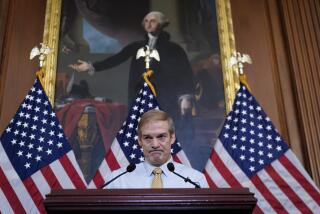PERSPECTIVE ON AMERICA : The Recession Is Not Just Economic : We’re also in social, cultural and political decline; we must rehabilitate our institutions and demand that they be morally rigorous.
- Share via
The signs of hard times are all around us: high unemployment, a low growth rate, corporate layoffs and bankrupt state and local governments. The only optimistic economic forecasts come from politicians running for reelection.
Less obvious, though, is that the economic recession is only the tip of the iceberg. As a nation we are also in a social, cultural and political recession. In fact, our situation is so severe that it is more accurately described as a depression. We live in a country that is not only economically impoverished relative to its past, but one that lacks the institutional resources it needs to revive itself.
Our government is incapable of inspiring trust in almost anything other than winning a morally bankrupt war for oil. Our education system is proving to be inadequate to prepare students for the complex responsibilities of citizenship. Adding to these problems, we have become so jaded that our outrage has turned to boredom when we hear of yet another senator, representative or government official caught in scandal.
Our once proud and honorable country has slipped into a profound malaise. A recent poll shows that 63% of Americans believe that the country is in a state of decline. Our streets are unsafe. Our bridges and roads are crumbling. Businesses are falling. Taxes are rising as services decline.
How are we fighting this? Do we have the resources to get back on track? As a nation we must rediscover and rebuild our moral and ethical foundation. At a recent conference in Berkeley on “The Good Society: Sources of Public Philosophy in America,” nationally recognized scholars joined with citizens to diagnose our problems and discover resources for renewal.
In order for America to come out of its slow downward spiral, people must become able to recognize their interdependence. In a complex society, the only possible way that interdependence can be realized is through institutions. If we are to find genuine hope, we must look for it in places like the family, schools and universities, corporations and workplaces, government and the political system and churches.
“Institutions are not simply large structures of power or of social problem-solving. They are moral enterprises, guided by moral meanings which instill and embody the moral commitments of their participants and which shape and are shaped by moral understandings,” said Ann Swidler, a UC Berkeley sociology professor, who participated in the conference. “The problem is that in many ways the morality of contemporary institutions is wrong.”
How can we change the moral meaning of institutions? One tempting road to follow--the one taken by Ronald Reagan, George Bush and David Duke--is to emulate the past in the belief that at one time America had a moral meaning, and if we could simply recover it, then we would once again be great. But this nostalgic yearning for the past is not adequate for our changed world.
“If one insists that the only morally rigorous institutions are the old ones--the family, the small town, the local community, the populist ideals of the 19th Century, then moral enterprise is a dead letter,” Swidler said. “We need to rethink the moral foundations of contemporary institutions--of the large state, of the corporation, of the university, of the church--in such a way that we demand that they be morally rigorous.”
In our diverse, fragmented, rudderless society, this will be a monumental task. But it is one that we must attempt, because even people with the means to escape to the suburbs are discovering that a dysfunctional society with bankrupt institutions follows them there. As a nation we need to transform our institutions into entities capable of sustaining our common life, to provide a structure for individual liberty and interdependence.
We can begin by talking to one another about our problems, our needs and our commitment. We must bring each other out of our collective denial, which has been encouraged for so many years by cynical, manipulative politicians and their handlers. By simply addressing problems, we will have taken the first crucial step toward transformation.
Let us begin by fostering genuine discussions about where we have been, where we are and where we want to go. The degree to which we are successful will affect us all, and whether we fail or succeed will depend on how well we respond to the challenge now, before we are overwhelmed.
More to Read
Sign up for Essential California
The most important California stories and recommendations in your inbox every morning.
You may occasionally receive promotional content from the Los Angeles Times.










